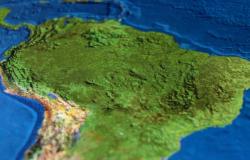Latin America: Between the Western World and the Global South

Alfredo Toro Hardy analyses where Latin America belongs.
In his seminal book The Clash of Civilization and the Remaking of World Order, Samuel P. Huntington makes a distinction between a Latin American Civilization and the Western Civilization. In his words: “Latin America, however, has a distinct identity which differentiates it from the West. Although an offspring of European civilization, Latin America has evolved along very different path from Europe and North America…The West, then, includes Europe, North America, plus other European settler countries such as Australia and New Zealand”. (Huntington, 1996, p. 46).
Old prejudices
Behind this apparent courtesy of granting Latin Americans their own civilization, lie old prejudices. A quote by Kenneth Clark in another seminal book, Civilisation, gives us its full extent. When explaining why Spain was excluded from his tale of the Western civilization he says: “…but when one asks what Spain has done to enlarge the human mind and pull mankind a few steps up the hill, the answer is less clear. Don Quixote, the Great Saints, the Jesuits in South America? Otherwise she has simply remained Spain”. (Clark, 1969, p. XVII).
How can this be said about a country that has produced Greco, Velasquez and Goya; Miro, Gris, Dali and Picasso; Quevedo, Lope de Vega and Calderon de la Barca; Perez Galdos and Garcia Lorca; Unamuno and Ortega y Gasset; Suarez and de las Casas; Vives, Moratin, Jovellanos or Feijoo; Ramon y Cajal and Marañon, and so many others? Only ignorance or outrageous bias can explain it. Ignorance, of course, is ruled out.
Clark’s prejudices respond to an longstanding tradition that goes back to the sixteenth century: The “Black Legend”. According to it, inquisition, intolerance and counter reform were Spain’s three main traits. It was a vision linked to Spain’s Charles V, mighty opposition to religious reforms. Or to Phillip II’s feud with Elizabethan England, or to his bloody crush of dissenters in present day Netherlands. And, of course, to the tale of Spain’s excesses in its American conquest.
Needless to say that there was much more than a grain of truth in the Black Legend. However, the blunt denial of everything that Spain has done for the cause of civilization, as exemplified by Kenneth Clark’s words, defies all standards of objectivity. This bias has been transmitted to Spain’s offspring in the Americas and is at the base of Huntington’s position.
In the fringes of the fringe
All that aside, however, Huntington touched a sore point of debate within Latin America itself: Is it part of the Western Civilization or is it not? Even well-known Mexican intellectual Leopoldo Zea refers to: “The two Americas - the Iberian and the Western one”. (Zea, 1976, p. 18).
Behind this distinction lies the idea that the Iberian Peninsula itself was not properly Western. Indeed, for many, Spain and Portugal did not fully belong to the West. This, not only because of the many centuries in which they were under Muslim control, but because the Renaissance and the Eighteenth-Century Enlightenment, scarcely reached them. Spanish intellectual Américo Castro wrote that Spaniards are not entirely Westerners, in the same manner in which Venezuela´s Arturo Uslar Pietri referred that Slavic and Iberian Europe didn’t properly fit within the central nucleus of Western Europe. (Uslar Pietri, 1981, pp. 243-245).
However, upon arrival to the Americas, Iberians did not form a settlers’ society as the English did in Northern America, Australia or New Zealand. Much to the contrary, they mingled. Initially, with the indigenous population. Subsequently, with the slaves brought from Africa. This gave rise to an acculturated society. In other words, Latin America would represent a fringe version of the Iberian fringe model.
What is the Western World?
Are thus Latin Americans part of the Western World? A brief background is in line before trying to provide an answer. Western civilization is the result of the interweaving between the Classical tradition - meaning the legacy of Greece and Rome - and the Judeo-Christian one. Renaissance and Enlightenment, have also to be added, but not on equal footing.
There were several instances in which the emergence of such civilization could have been aborted. The first of them came with the invasion of Greece by the Persians. As subjects of an Asian king, the Athenians would have never had the opportunity to develop their unique democratic culture. But also Roman predominance could have been cut short. If instead of a “Carthago delenda est”, there would have been a “Rome delenda est”, no Classical tradition would have emerged.
Something similar could be said of the Judeo-Christian tradition. The Jews might have never returned from their imprisonment in Babylon. Christianity, on its part, may have never become what it did, if Saint Paul had not converted into this new religion. Nor would Christianity and the Roman Empire have fused, if Emperor Constantine had not prevailed in the civil war that took place within the so called Roman Tetrarchy.
Tons of “contrafactual history” could thus be written in this regard. In the end, though, a very particular mixture of traditions and knowledge, which were able to survive against all odds, became the essence of Western Civilization.
A Latin American way of being Westerners
What entitlement does Latin America have in relation to this heritage? Arturo Uslar Pietri provides the answer:
“Colonization was a process of incorporation unto the Western values. Family, home, urbanization, social relation, the situation of women and children, came to us by way of the Church and the Law of the Indies, directly from Roman law by way of the Castilian Statutory Code of the ‘Siete Partidas’. The concept of law, of the State, of crime and punishment, of property, came to us in a straight line from the Justinian Code. We do not have any other legal base, nor do we have any other conception of the human being and its dignity. During five centuries we have been submitted to the Western culture, which is not only ours but also the only one we have. We certainly belong to it, but in our own way. We have a Latin American way of being Westerners”. (Uslar Pietri, 1979, p. 278).
But, what does he mean by a “Latin American way of being Westerners”? To begin with, it must be remember that Latin America is an acculturated society, which by extension entails a mixed identity. However, even if powerful influences moved in every direction within this acculturation process, not all of its three original components contributed in equal measure to the final product. Within this mix, Indigenous and black heritage had to submit to the cultural hegemony of the Iberians. The latter remained the undisputed guiding force, determining language, religion, law, family values, architectural traditions, and the like.
Latin America’s culture is Roman-Catholic, Latin, Scholastic and Thomist. Meaning, a group of fundamental Western traits. Even accepting the limitations of Iberians as full members of the Western World, and adding to it the acculturation process that took place in the New World, Latin Americans still remain Westerners. They are, however, within its periphery. Theirs, is an acculturated society with a clearly dominant Roman-Christian heritage that co-exist, sometimes peacefully, sometimes wistfully, and even belligerently, with the values of its other cultural identities.
Latin America within the Global South
As such, even if they are within the borderline of Western civilization, they are still part of it. Their location, although very close to the walls that encapsulates this world, remains inside them. Their peripheral neighbourhood, though, has easy access to the exit gates of such civilization. As inhabitants of the Western World’s fringe, they are able to move with total ease inside its walls. At the same time, however, they can easily cross outside and watch such walls with a critical and even surprised perspective. Few other Westerners, if any, enjoy of this particular duality.
Where does this place Latin America within the Global South? Contrary to countries like India, Indonesia or Vietnam, to mention just a few examples, it cannot claim a distinct identity. Colonization in its case was not a superficial phenomenon that altered the essence of its ancient societies, as it happened in the three abovementioned cases. On the contrary, it erased most of its pre-Columbian memories. (Mann, 2011, Chapter 1, Loc 748). With the exception of certain areas in the Upper Andes and in Middle America (or for the matter in the jungles of the Amazon), where the Indigenous populations remained barely untouched, acculturation distinctively prevailed. An Iberian led acculturation.
Two reasons can explain this disconnection with the past: Diseases and religious overzealousness. Smallpox, measles, typhus and other European illnesses to which the Indigenous populations had no resistance, reduced them to around 12 percent of the original total of about 30 to 40 million in 1500. According to John E. Kicza, without such demographic catastrophe, modern Latin America would more closely resemble Africa or India, were the European impact, although significant, did not radically alter old societies. (Kickza, 2004, p. 20; Restrepo, 2014, p. 51). Religious fundamentalism took care of the rest, as in the process of expunging paganism, Iberians destroyed and swept away, as much as they could, the memories, the knowledge and the identity of the Indigenous civilizations.
As a result, contrary to the bulk of the Global South, Latin Americans are still within the boundaries of the Western World. However, their peripherical nature allows them to relate equally easy with those inside or outside its walls. As a matter of fact, they are ideally suited to bridge these two worlds.
Alfredo Toro Hardy, PhD, is a retired Venezuelan career diplomat, scholar and author. Former Ambassador to the U.S., U.K., Spain, Brazil, Ireland, Chile and Singapore. Author or co-author of thirty-six books on international affairs. Former Fulbright Scholar and Visiting Professor at Princeton and Brasilia universities. He is an Honorary Fellow of the Geneva School of Diplomacy and International Relations and a member of the Review Panel of the Rockefeller Foundation Bellagio Center.
Photo by Pixabay
References
Clark, Kenneth (1969). Civilization. New York: Harper & Row Publishers.
Huntington, Samuel P. (1966). The Clash of Civilization and the Remaking of World Order. New York: Simon & Schuster.
Mann, Charles C. (2011). 1491: New Revelations of the Americas Before Colombus. New York: Vintage Books.
Restrepo, Luis Fernando, “The Cultures of Colonialism” in Swanson Philip, Editor (2003). The Companion of Latin American Studies. London: Routledge.
Uslar Pietri, Arturo (1979). Fantasmas de Dos Mundos. Barcelona: Editorial Seix Barral.
Zea, Leopoldo (1976). El Pensamiento Latinoamericano. Barcelona: Editorial Ariel.
Kicza, John E., Editor (2004) The Indian in the Latin American History. Oxford: SR Books.


